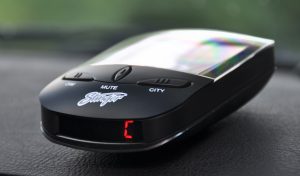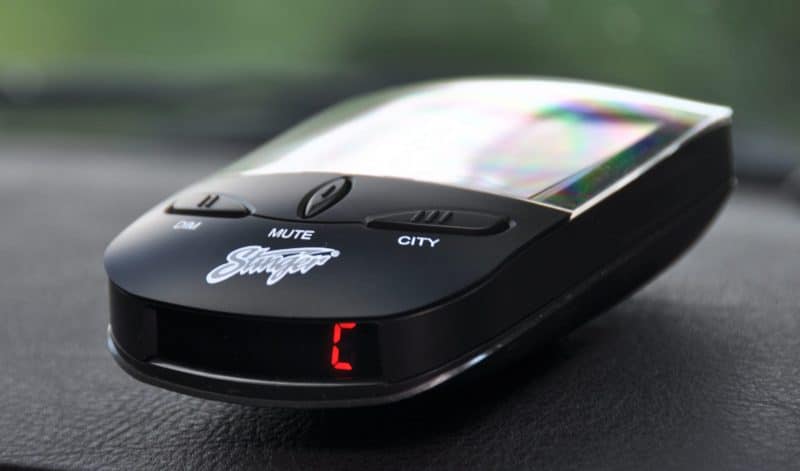 Have you ever been riding with a friend and noticed a little black device hooked to their windshield or visor? Did a beep from this device or a bunch of flashing green and red lights cause the driver to suddenly slow down and start nervously searching for some unknown object? If so, chances are that little black device was most likely a radar detector or “jammer.”
Have you ever been riding with a friend and noticed a little black device hooked to their windshield or visor? Did a beep from this device or a bunch of flashing green and red lights cause the driver to suddenly slow down and start nervously searching for some unknown object? If so, chances are that little black device was most likely a radar detector or “jammer.”
Table of Contents
What Is a Radar Detector and How Does It Work?
Radar detectors are devices that locate and signal traffic radar systems that are used by law enforcement to detect a driver’s speed. A radar detector picks up the signal emitted from a radar system and alerts the driver by using colored lights or beeping noises, warning that a law enforcement official may be close by.
Most of these detectors can be suctioned to your windshield, mounted on your dashboard, or clipped to your visor. Many offer options for city and highway driving as a way of controlling the sensitivity of the detector and keeping it from alerting you to every self-installed alarm system or laser tag gun around.
Ebay has provided a more detailed explanation:
Law enforcement use radar guns to detect the speed of passing cars. The radar guns send electromagnetic currents that reach targeted vehicles. Target vehicles send back echoing data waves to the radar gun’s amplifier, which allow law enforcement to measure a car’s speed. Car speed is measured by the change in electromagnetic wave speed from the radar gun to the car, and then the return from the car to the radar gun.
To prevent detection, motorists use radar detectors to send electromagnetic waves that only specifically designed tuners can receive. The electromagnetic waves detect the transmitter and amplifier of a radar gun. Manufacturers set radar detectors to a rigid scale, so the detectors do not confuse radar gun waves with those transmitted by wireless towers. Most radar detectors can penetrate obstructions to detect radar guns, which is why some law enforcement officials move out of their cars and behind solid structures, such as highway overpasses, to send radar gun waves. Radar detectors warn motorists by detecting the speed and direction of a radar gun’s electromagnetic waves.
Other Types of Detectors
There are also radar jammers which completely jam the incoming signal of radar guns and either manipulate or block law enforcement from seeing their speed. There are also special types of paints, known as stealth coating, which will absorb lasers from laser type radar guns and will even block traffic radars from picking up on your license plate.
Wait, Are These Legal?
Most of the time, radar detectors are legal. Ebay said:
The Federal Communications Commission has never issued an edict that regulates or bans radar detectors. Federal purview on this issue cedes legal authority to the states. Nonetheless, the FCC has tried in the past to impose general legal language as it applies to radio devices, such as ham radios and other devices that can receive police transmitted frequencies. Since 1993, when the FCC incorporated the broad legal language into regulations, not one court has made the connection between ham radio receivers and radar detectors.
However, you should check with your local state laws to find out what the laws in your state prohibit.
Utah laws on Radar detectors state:
Radar Detectors in Utah: Radar detectors are legal to use in Utah, however they may not be used in commercial vehicles.
Laser Jammers in Utah: Laser jammers are illegal to use in Utah.
Source: Utah Code, Title 41, Chapter 06a
41-6a-609. Radar jamming devices and jamming radar prohibited — Defense — Exceptions — Penalties.
(1) As used in this section, “radar jamming device” means any instrument or mechanism designed or intended to interfere with theradar or any laser that is used by law enforcement personnel to measure the speed of a motor vehicle on a highway.
(2) (a) A person may not operate a motor vehicle on a highway with a radar jamming device in the motor vehicle.
(b) A person may not knowingly use a radar jamming device to interfere with the radar signals or lasers used by law enforcement personnel to measure the speed of a motor vehicle on a highway.
(3) It is an affirmative defense to a charge under Subsection (2)(a) that the radar jamming device was in an inoperative condition or could not be readily used at the time of the arrest or citation.
(4) This section does not apply to law enforcement personnel acting in their official capacity.
(5) A person who violates this section is guilty of a class C misdemeanor.
Renumbered and Amended by Chapter 2, 2005 General Session
So Should You Get A Radar Detector?
Ideally, you won’t be speeding and therefore won’t need to know if a cop is tracking your speed. Also, cops know about radar detectors and they have some tricks up their sleeves too: they have devices that can detect radar detectors; they will often park and stand behind concrete walls or overpasses where their radars aren’t detected; and they can always match your speed for a mile as a way to measure how fast you are going.
Also, your insurance policy can go up from the use of these detectors.
What Do We Think?
If you constantly obey traffic rules, as you should, then you have nothing to worry about.
Information Acquired from DMV.Org
